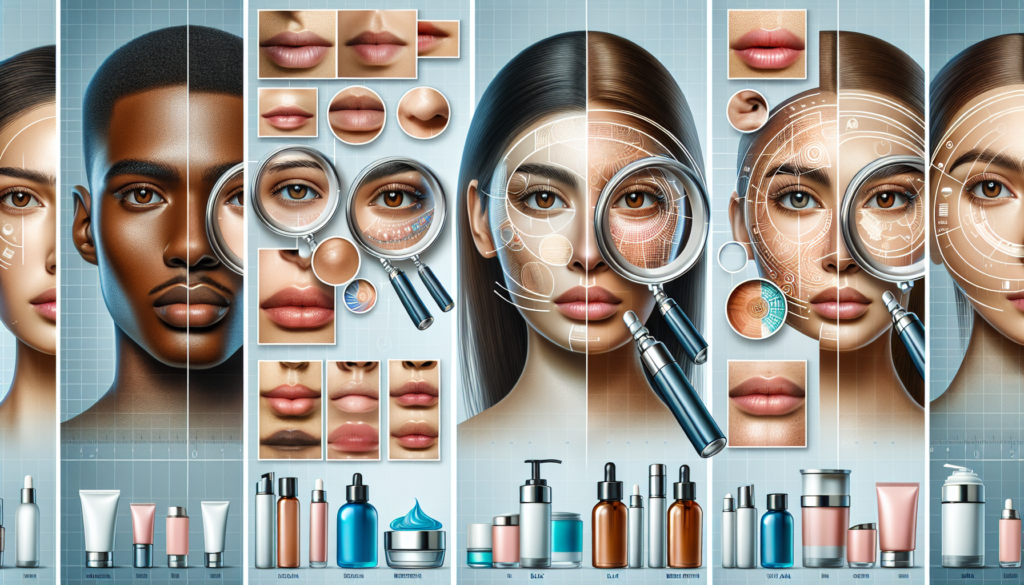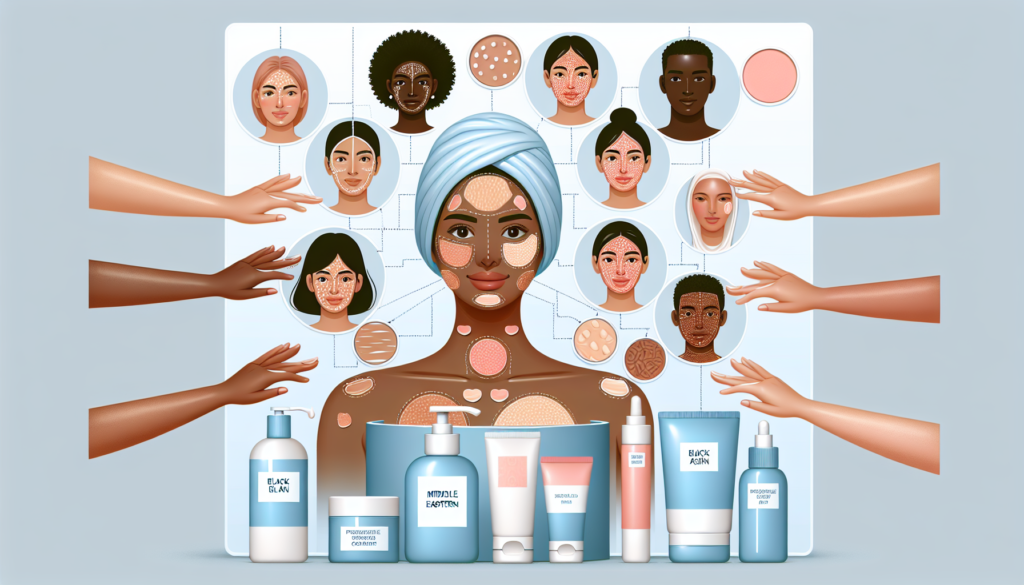
Embarking on a personalized skincare journey is the key to unlocking your skin’s radiant potential. By understanding the importance of skin analysis, you can tailor your skincare routine to match your unique complexion’s needs. Just like snowflakes, no two faces are identical, and neglecting this crucial first step can leave you frustrated and ineffective in achieving your desired results. With a DIY home skin lab and the guidance of professionals, you can decode your skin’s language, unmask any underlying concerns, and craft a personalized routine that truly works for you. Consistency and adjustments based on your evolving needs will lead you on the path to optimal results and unlock your radiant glow.

Why Assess?
Understanding your individual skin needs is crucial for achieving healthy and radiant skin. Your skin is unique, just like you, and it has its own story to tell. By neglecting the assessment step in your skincare routine, you may be missing out on addressing specific concerns and tailoring your approach to achieve the best results.
Your Home Skin Lab:
You don’t need fancy tools or gadgets to assess your skin. With these simple DIY techniques, you can uncover your skin’s secrets:
Visual Examination:
Take a close look at your skin’s overall tone, texture, and pore size. Are there any blemishes, redness, or other noticeable concerns? By analyzing these visual aspects, you can gain insights into your skin’s health.
Touch Test:
Feel your skin’s texture and elasticity. Is it smooth and supple, or does it feel rough and dry? Gently pinch your skin and see how quickly it bounces back. These observations can give you clues about your skin’s hydration level and overall health.
Blotting Test:
If you have oily skin concerns, grab a blotting sheet and press it against different areas of your face. Does it readily absorb oil? This might indicate that you have oily or combination skin, allowing you to choose the appropriate skincare products.
Patch Test:
If you suspect any sensitivities or allergies, perform a patch test before introducing new products. Apply a small amount of the product to a hidden area, such as behind your ear, and observe your skin for any redness, stinging, or irritation. Your skin’s reaction will help you identify potential allergens or irritants.
While these DIY techniques offer valuable insights, it’s important to note that online quizzes and tools may not provide a comprehensive analysis. For a deeper understanding of your skin’s needs and personalized recommendations, consulting a dermatologist or esthetician is highly recommended.

Unmasking Your Skin’s Story:
Once you’ve assessed your skin, it’s time to uncover any hidden concerns that may be affecting its health. Here are some common skin concerns and their possible causes:
Acne:
Pimples, blackheads, and whiteheads can be caused by hormonal fluctuations, clogged pores, or bacterial overgrowth. Identifying the root cause of your acne can help you choose the right treatment and prevent future breakouts.
Dryness:
If your skin feels tight, flaky, or shows visible peeling, dryness may be the culprit. Factors such as genetics, weather conditions, and the use of harsh products can contribute to dry skin. Hydrating and nourishing your skin is essential to alleviate dryness and restore its health.
Oilyness:
Shiny skin that is prone to breakouts may be a result of excess sebum production, hormonal factors, or improper cleansing. Balancing oil production and maintaining a proper skincare routine can help control oiliness and prevent acne.
Sensitivity:
If your skin easily reacts to fragrances, alcohol, or certain ingredients, you may have sensitive skin. Redness, stinging, and burning are common signs of sensitivity. Choosing gentle and hypoallergenic products can minimize these reactions and keep your skin calm and comfortable.
Aging Signs:
Fine lines, wrinkles, and a loss of elasticity are natural signs of aging. However, factors such as sun exposure, lifestyle choices, and genetics can influence their appearance. Incorporating anti-aging ingredients and practices into your skincare routine can help minimize the visible signs of aging.
Remember, these are just a few examples of common skin concerns. Your skin is unique, and it may have its own individual needs. Professional analysis and guidance can help you uncover the specifics of your skin’s story and determine the most effective solutions.

Crafting Your Personalized Routine:
Armed with the knowledge of your skin assessment and identified concerns, it’s time to create a personalized skincare routine. Here are some key considerations:
Cleanse Wisely:
Choose a cleanser that suits your skin type and concerns. For dry skin, go for gentle and hydrating cleansers. Oily skin benefits from oil-free formulas, while sensitive skin requires fragrance-free options. Cleansing your skin effectively sets the foundation for a healthy skincare routine.
Moisture is Key:
Regardless of your skin type, proper hydration is crucial. Choose a moisturizer that suits your needs, whether it’s a lightweight lotion for oily skin or a richer cream for dry skin. Hydrated skin is healthier, more balanced, and better equipped to fight off environmental aggressors.
Target Specific Concerns:
Serums and treatments are powerful tools to address specific concerns. For hydration, look for products containing hyaluronic acid. Retinol is a popular ingredient for anti-aging, as it stimulates collagen production. Niacinamide can help control acne and minimize the appearance of pores. Tailor your skincare routine to target your specific concerns.
SPF is Your Shield:
Sun protection is non-negotiable for maintaining healthy and youthful-looking skin. Choose a broad-spectrum sunscreen with an SPF of 30 or higher. Remember to reapply every two hours, especially after swimming or sweating. Shielding your skin from harmful UV rays helps prevent premature aging and reduces the risk of skin cancer.
Consistency is key when it comes to skincare. Stick to your routine and make adjustments as needed based on seasonal changes, lifestyle factors, or your skin’s evolving needs. With dedication and the right products, you can unlock your skin’s radiant glow.

Unlocking Radiance:
Witness the power of personalized skincare with these inspiring examples:
Sarah’s Story:
Sarah battled with stubborn acne for years, trying various products with limited success. Through a professional skin assessment, she discovered that her acne was caused by hormonal imbalances. With a customized routine that included acne-fighting ingredients and hormonal regulation supplements, Sarah’s skin transformed. Her confidence soared, and she experienced overall improved well-being.
Michael’s Transformation:
As Michael aged, he noticed fine lines and sun damage on his skin. A professional skin analysis revealed early signs of photoaging. With the guidance of an esthetician, he adopted a routine rich in antioxidants and incorporated retinol for collagen stimulation. Over time, Michael regained a youthful glow, and the appearance of wrinkles visibly diminished.
These success stories highlight the importance of a personalized skincare routine. By understanding your skin’s needs and addressing specific concerns, you can achieve remarkable results and unlock your skin’s radiant potential.
Remember, your skin is unique, and it deserves tailored care. Embrace the power of skin assessment and embark on a personalized journey to unlock your skin’s radiant glow. With the right knowledge, products, and consistency, you can achieve healthy and beautiful skin that reflects your inner beauty.









Thanks for sharing. I read many of your blog posts, cool, your blog is very good.